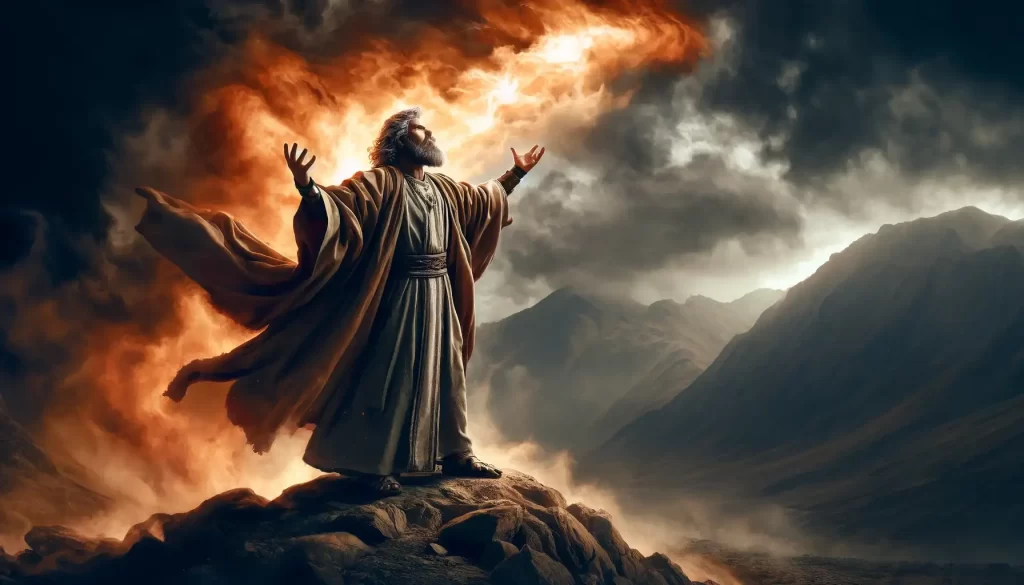
National Association of Christian Ministers Summary Series
Elijah, whose name in Hebrew means “Yahweh is my God,” is a prominent figure in the Bible and one of the greatest prophets of Israel. His story is found primarily in the First and Second Books of Kings in the Old Testament. Elijah’s ministry took place during the reign of King Ahab and Queen Jezebel in the northern kingdom of Israel, around the 9th century BCE. Here is a biography of Elijah with scriptural citations:
1. Early Life and Call (1 Kings 17:1):
Elijah’s background is not provided in detail, but he is introduced as “Elijah the Tishbite, from Tishbe in Gilead.” He suddenly appears on the scene with a bold proclamation to King Ahab: “As the Lord, the God of Israel, lives, whom I serve, there will be neither dew nor rain in the next few years except at my word.”
2. Hiding at the Brook Cherith (1 Kings 17:2-7):
Following his prophecy of a drought, God directs Elijah to hide by the Brook Cherith, where he is miraculously sustained by ravens who bring him food each morning and evening.
3. Stay with the Widow of Zarephath (1 Kings 17:8-16):
During the drought, God instructs Elijah to go to Zarephath and find a widow who will provide for him. Elijah encounters a widow gathering sticks and asks for a drink of water and a piece of bread. The widow, facing starvation herself, hesitates, but Elijah assures her that God will provide. Miraculously, her flour and oil never run out, sustaining her, her son, and Elijah.
4. Raising the Widow’s Son (1 Kings 17:17-24):
The widow’s son falls ill and dies, which distresses her greatly. Elijah takes the boy, cries out to God, and pleads for the boy’s life. God hears Elijah’s prayer, and the boy is revived, demonstrating God’s power through Elijah.
5. The Contest on Mount Carmel (1 Kings 18:20-46):
Elijah challenges the prophets of the false god Baal to a contest on Mount Carmel. Both groups build altars, and Elijah challenges the prophets of Baal to call on their god to consume their offering. Despite their efforts, nothing happens. Elijah then calls on the Lord, who sends fire from heaven, consuming Elijah’s offering and affirming that Yahweh is the one true God. Elijah then orders the execution of the false prophets.
6. The Still Small Voice (1 Kings 19:9-18):
After the contest, Queen Jezebel threatens to kill Elijah, forcing him to flee for his life. In his despair, Elijah seeks God on Mount Horeb. God reveals Himself to Elijah not in wind, earthquake, or fire, but in a gentle whisper, reminding Elijah that God is present even in the midst of hardship. God assures Elijah that he is not alone and instructs him to anoint new kings and Elisha as his successor.
7. Passing the Mantle to Elisha (1 Kings 19:19-21):
Elijah finds Elisha plowing a field and throws his mantle, or cloak, over him, symbolizing his calling as Elijah’s successor. Elisha immediately leaves his oxen and follows Elijah, becoming his servant.
8. Final Days and Ascension (2 Kings 2:1-18):
As Elijah’s ministry nears its end, he embarks on a journey to various locations, accompanied by Elisha. On the banks of the Jordan River, Elijah parts the waters with his mantle, allowing them to cross on dry ground. As they continue walking and talking, a chariot of fire with horses of fire appears and separates Elijah from Elisha. Elijah is taken up to heaven in a whirlwind, leaving behind his mantle for Elisha.
Elijah’s life and ministry display unwavering faith, powerful miracles, and his unwavering commitment to God’s message. His name is mentioned throughout the Bible, including in the New Testament, where he is seen as a significant figure and even appears alongside Moses during Jesus’ transfiguration (Matthew 17:1-8).




